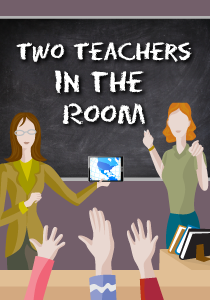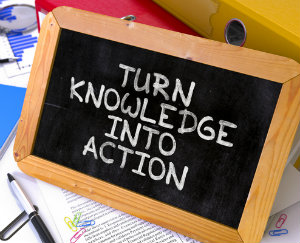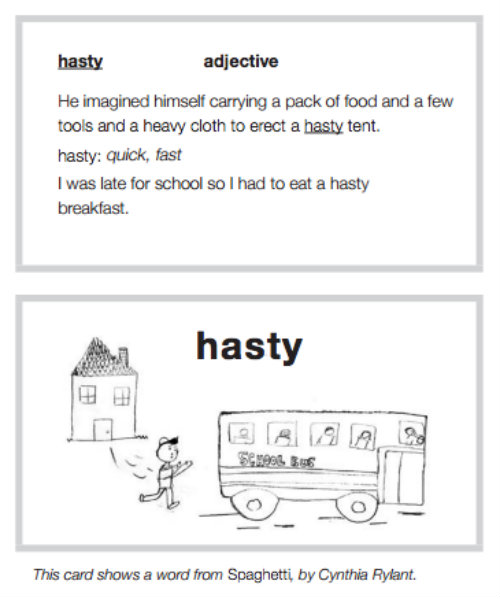We Can Be Co-Teaching Change Agents
A MiddleWeb Blog
 As we approach the end of another school year, it’s a good time to consider the glorious opportunity we teachers have to be an agent of change. And co-teachers, we have additional opportunities to elevate our voices and intentional actions!
As we approach the end of another school year, it’s a good time to consider the glorious opportunity we teachers have to be an agent of change. And co-teachers, we have additional opportunities to elevate our voices and intentional actions!
We can change the way our students gain knowledge. We can change attitudes. We can change mindsets. We can improve the ways we motivate and guide students and colleagues to motivate themselves! Not to mention the outcomes for our own personal and professional growth.
According to Sheryl Nussbaum-Beach, CEO at Powerful Learning Practice, “A change agent, or agent of change, is someone who intentionally or indirectly causes or accelerates social, cultural, or behavioral change.”

Co-teachers have the opportunity to guide the transformation and help change the way students view themselves as learners AND the way teachers and parents view educating diverse learners.
Oh, the possibilities! In this week’s post, let’s stretch our co-teacher muscles and take those first steps to becoming a co-teaching change agent….
Starting Point
Consider your role as a change agent this school year. What have you done to shape the path for students to become better versions of themselves? How have you guided your students to exceed beyond their comfort zones? How have your actions propelled you and your co-teacher to create accessible and meaningful learning for your students?
Did your actions deepen the instructional decisions you and your co-teacher made? Have your actions this year created long-term results with the potential for better and better outcomes?
An Example for Lasting Change
Over the past few weeks, I’ve been recalling a few lessons I implemented with teachers in a variety of classrooms. One lesson in particular resonates with me now.
I went in to a 6th grade classroom to model a vocabulary strategy that would serve to engage each learner to attend during a read-aloud. The purpose of the read-aloud was to have the students hear vocabulary words in context as they gained a new and/or deeper understanding of the word meanings.
The strategy, Lansdown Word Cards, serves to not only keep students listening during the read-aloud, but it keeps them visualizing and considering the meaning of each word in the context of the text. I embedded some student-led discussions to gauge the learning and also to guide students to self-motivate and give their attention to this task of learning vocabulary words.
During our debriefing of the lesson, the general education teacher’s first comment to me was, “Wow, that was really organic.” She continued to say how moved she was to see how engaged her students were. “Even the quiet students participated in their group discussions. I just loved the energy in the room.”
As I checked in with this teacher two weeks later, she told me that she and her co-teacher were incorporating more time for students to weigh in on class discussions. Students were sharing their views more frequently.
These co-teachers are now employing flexible grouping on a weekly basis. Gone are the days of students in their class sitting in rows, day in and day out. Together, these two co-teachers and I have created some real change in the way they view students’ voice, the learning process, and the way their instructional decisions impact long-term outcomes – creating learners who will move beyond the walls of their classroom with more confidence and understanding.
Be the Change…
What can you do for the remainder of this year? And what about your role as a co-teaching change agent next year?
- Identify Your Role as a Co-Teacher: Make sure you identify with your talents and expertise and then share your ideas with your co-teacher. Advocate for your role as a special educator or as a general educator. Your talents and expertise need to be heard and seen as you guide your students to become empowered learners. What is your vision for a successful lesson? What is your vision for a successful co-teaching experience for you and your co-teacher and for your students? Bring your knowledge and passion for teaching and learning to the co-teaching experience.
Push Beyond the Status Quo: Create a plan for moving your co-teacher, you, and your students beyond comfort zones. Never accept “good enough” as good enough. Strive to create a path that exceeds what your co-teacher and you thought you could accomplish. Pave the way for your students to surpass what they thought they could do.
- Stay Focused—Stay Passionate: Change is not easy for many people. Now that we know that (I realize that really isn’t news to anyone!), don’t let it stop you. Model the excitement, that awe-inspiring process of being engaged in meaningful learning. Always find the self-motivator in you to boost your energy when others around you may not be up to taking the risks that you know must be taken. Please…take…the risk to make positive change.
- Cultivate Relationships: Meet your co-teacher, other colleagues, and your students where they are and then guide them with encouragement along the path to developing positive change. Focus on the positive aspects of each colleague and student as they move beyond their current place along the continuum of change. As these relationships are valued and each person’s perspective is validated, the heart to break free from the status quo will more likely override prior conceptions.
As we take these first mindful steps toward being a co-teaching change agent, think about your contributions in breaking through beyond the status quo to guide positive change in your co-teaching experiences.
Let’s take another look…
Consider your role as a change agent this year.

► How have you guided your students to exceed beyond their comfort zones?
► How have your actions propelled you and your co-teacher to create accessible and meaningful learning for your students?
► Did your actions deepen you and your co-teacher’s instructional decisions?
► Have your actions this year created long-term results—with the potential for evolving outcomes?


 Push Beyond the Status Quo: Create a plan for moving your co-teacher, you, and your students beyond comfort zones. Never accept “good enough” as good enough. Strive to create a path that exceeds what your co-teacher and you thought you could accomplish. Pave the way for your students to surpass what they thought they could do.
Push Beyond the Status Quo: Create a plan for moving your co-teacher, you, and your students beyond comfort zones. Never accept “good enough” as good enough. Strive to create a path that exceeds what your co-teacher and you thought you could accomplish. Pave the way for your students to surpass what they thought they could do.
































